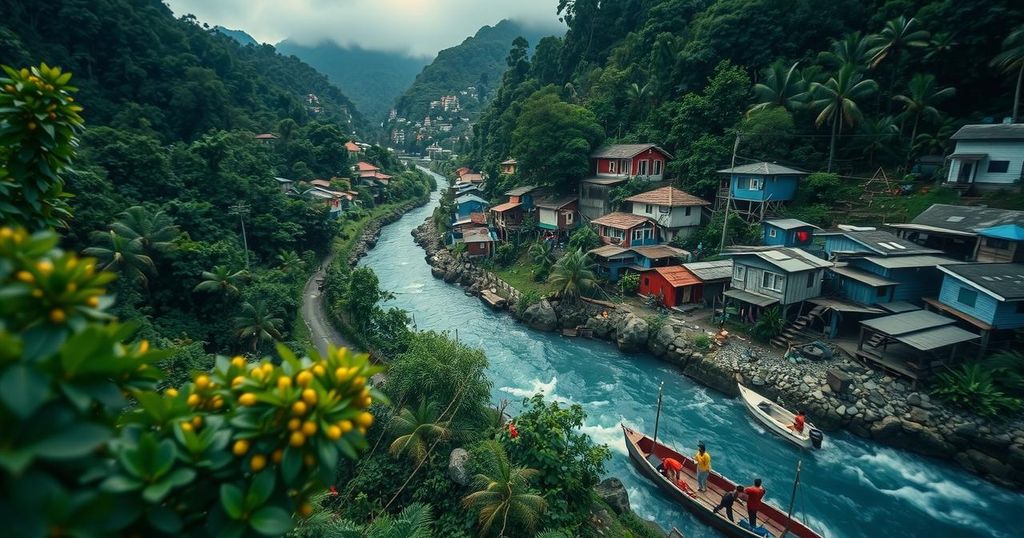Surge in Darién Gap Migration: Venezuelans Lead the Way Post-Election
The migration through the Darién Gap escalated sharply in September as Venezuelans sought to flee their country after a controversial election. With over 25,000 crossings in September alone, the need for assistance remains critical amidst a declining capacity to support these migrants due to political and humanitarian issues.
The migration of individuals traveling through the Darién Gap—a treacherous jungle route connecting Colombia to Panama—saw a notable rise in September 2024. This surge was predominantly driven by Venezuelans following the country’s contentious presidential election. Reports from the Panamanian government indicate a sharp increase in crossings, with a human rights organization, Refugees International, expressing concerns regarding the dwindling capacity to provide adequate assistance to migrants. Since 2022, Venezuelans have comprised the majority of migrants traversing this perilous terrain, a trend that has intensified after the controversial election held on July 28, 2024. Following this event, Refugees International noted, “The crackdown in the wake of the … elections in Venezuela has led to an increase in immigration.” In 2023, over half a million migrants ventured through the Darién Gap, with Venezuelans accounting for 65% of this historical number. In light of the increase in migration, Panamanian President José Raúl Mulino announced plans to mitigate this trend by closing access points and establishing a repatriation program in coordination with the United States. However, relations with Venezuela have deteriorated since Panama chose not to acknowledge the election results claimed by Nicolás Maduro, effectively halting flights between the two nations. Despite a year-to-date total of 277,939 migrants crossing through the Darién being down by 36% compared to the previous year, September saw a dramatic uptick with 25,111 migrants recorded, marking a 51% increase from August. The Venezuelan population represented over 80% of these crossings, alongside groups from Colombia, Ecuador, China, and other countries. Refugees International reported that while Panamanian government policies might have temporarily restrained migration, these measures did not prove effective in the long-term. Upon exiting the Darién, migrants reportedly encountered reduced humanitarian aid in Panama. “For those who aren’t Venezuelan, they encounter the threat of deportation,” the report elucidated. This situation has been exacerbated by the suspension of services from Doctors Without Borders (MSF) earlier in the year due to administrative issues with the Panamanian government. This organization previously played a crucial role in providing healthcare to migrants, having treated over 72,700 individuals from January 2023 to February 2024. MSF has recently resumed operations at the Lajas Blancas reception station following the approval for a temporary medical intervention.
The Darién Gap is a notoriously dangerous passage that poses numerous challenges for migrants seeking to travel from Colombia to Panama and eventually to the United States. The route is characterized by its harsh jungle environment, which heightens the risks associated with migration, including violence, exploitation, and lack of medical aid. The rise in migration through this area correlates with political instability, particularly from countries such as Venezuela, where recent elections have led to increased repression and discontent among the populace. As nations grapple with the flow of migrants, the humanitarian system present in Panama faces overwhelming pressures, necessitated by the influx and lack of resources to assist migrants effectively.
In summary, the migration crisis through the Darién Gap has intensified, driven primarily by Venezuelans fleeing political turmoil following recent elections. Despite a decrease in overall numbers for the year, September witnessed record crossings. The humanitarian situation remains dire, with limited support available for incoming migrants. Efforts by Panamanian authorities to manage migration pose challenges, especially with significant Venezuelan flow, exacerbated by political and diplomatic issues. The future of migration through this route requires effective international cooperation to address both the needs of migrants and the pressures faced by transit countries.
Original Source: apnews.com




Post Comment